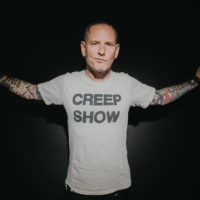- Roots
- World Coming Down
- 3
- The Hunter
- Meanwhile In Burbank
- Life Is Killing Me
- The State
- Magic Mountain
- Satyricon
- Killswitch Engage
- Through The Ashes Of Empires
- ODYSSEY
- Curb
- All The Right Reasons
- Slash
- Systematic Chaos
- Hellalive
- Bloody Kisses
- Between The Devil & The Deep Blue Sea
- The Crusade
- Beneath The Remains
- The Burning Red
- LIVING THE DREAM
- Burn My Eyes
- L’Enfant Sauvage
- All Hope Is Gone
- Savages
- The Callous Heart
- Beast
- SUPREMACY
- Chaos A.D.
- Scar The Martyr
- BIG ASS LOVE / TAKE AWAY THE PAIN
- Graveyard Shift
- Harvest Of Darkness
- Still Life Moving Fast
- World On Fire
- Resolution
- Incarnate
- 8:18
- Be Nice
- APOCALYPTIC LOVE
- The End Of Heartache
- The Blackening
- Memoirs Of A Murderer
- Forever
- BORN COLD
- Ghost Reveries
- Audio Secrecy
- Unto The Locust
COREY TAYLOR TALKS ABOUT METAL & THE LACK OF SUPPORT IN PRESS FOR THE GENRE WITH GUARDIAN CRITIC ALEXIS PETRIDIS…
Posted on June 22, 2012As we here at Castle Roadrunner are only too aware, Metal bands fill stadiums and enjoy long careers but get little attention in the media. SLIPKNOT / STONE SOUR frontman COREY TAYLOR and Guardian critic Alexis Petridis discussed why in a piece on the Guardian’s website recently and you can see what Corey had to say on the matter below:
Alexis Petridis: How would you explain heavy metal’s appeal to someone who has never got it?
Corey Taylor: It’s the last real rebellious spirit in music. People can talk about punk all they want, but after new wave put that down, metal is the voice of the disenfranchised and that need to become unhinged. That’s why it appeals to so many people when they are younger, and carries over when those people, at 40, don’t want to grow up. I’m 38 and I listen to everything I listened to when I was 14. Are you a metal fan?
AP: No. It never grabbed me as a kid. Maybe I wasn’t angry enough. I’ve tried to listen to it as an adult – I tried to approach the Slayer album Reign in Blood as a piece of extreme music, I’ve tried to listen to Norwegian death metal as a piece of avant garde art and it just doesn’t do it for me.
CT: There is that stigma around metal – that’s it’s dumb, Neanderthal – which is such bullshit. Some of the smartest people I know are metal fans.
AP: I think metal fans know aspects of it are ridiculous – if you see Ronnie James Dio [the late Black Sabbath singer] fighting a dragon on stage, it’s not like you’re going: “This guy’s really fighting a dragon.” But there is the perception from the outside that it is dumb.
CT: I’m not saying there are sections that aren’t, but if you listen to some of the music, it’s very intricate, layered. You have to be at least sort of savvy to get into it.
AP: Metal has managed to retain that sense of being rebellious, while still selling millions of records. How has it managed to pull this off?
CT: The next generation are always trying to up the ante. Younger bands are trying to push it harder, trying to find that frenzy that hasn’t been done before. That’s why I love finding new bands. There’s one called Trash Talk – I go to their shows and I haven’t felt like that since I first saw Slipknot when I wasn’t even in the band. Black Sabbath begat Metallica begat Marilyn Manson begat us – there’s this need to raise the bar. I don’t see that in any other genre.
AP: If you’re a suburban teenager, I can see how the music appeals to you – it expresses how pissed off you are – but also it provides a kind of fraternity to which you can belong. You’re not going to be the loner kid if you’re into metal – you’ve got this global fraternity.
CT: There is a tribal spirit that comes with it. When I was growing up, I felt there was nobody like me but I found people who it didn’t matter to who I was, just the fact I was a metal fan. The weird thing about metal fans is we’re all so maladjusted in a lot of ways. We’re individualistic and opinionated and severe in our personalities – sometimes we really turn each other off. A little bit of a metal fan goes a long way [laughs].
AP: The lovely thing about metal fans is that they’re incredibly loyal. We live in a world where in any other genre – hip-hop, pop, alt-rock – things move very quickly. Artists have one or two albums, then they vanish. In metal, bands are allowed to develop. You get situations where a band can be headlining Wembley arena for the first time and they’re on their sixth album, which wouldn’t happen in any other genre. There’s also that way in which it didn’t matter to the fans if Ozzy had left Black Sabbath and they have a different singer. It’s the one genre I can think of where bands can undergo immense lineup changes that would kill a mainstream rock band stone-dead.
CT: We’re very accepting. Perfect example – we all knew Rob Halford [singer of Judas Priest] was gay for years. Then he comes out of the closet and people are like: “Of course.” It’s a genre that’s supposed to be homophobic – and in a lot of ways it is – but we’re very accepting. The stereotypes are ridiculous. Here’s a man who comes out and the band is bigger than ever.
CT: You talk about metal being an outlet for being unhinged. As you get older, is it harder to summon that up? Does it become more of an act? Slipknot is a band founded on anger and misanthropy. Do you still feel as angry, as misanthropic? You seem well adjusted to me.
CT: You can be adjusted and still be pissed off. I have a balanced way of hating everyone [laughs]. I remember what it’s like to be ripped apart when you’re a kid. I can remember growing up poor. I can remember growing up hungry. I can remember growing up really disliked. Now, it’s so much more brutal than it was when I was at school. There is still stuff I rage about.
AP: Do you think metal deserves more mainstream attention that it gets?
CT: I don’t know if it needs more attention but it needs more respect. The Rock’n’roll Hall of Fame is a joke – the fact that Madonna is in before Rush and Kiss. Those two bands have influenced so many groups and people other than in metal. I wouldn’t say that we give a shit about acceptance. I just want respect for the bands who laid the way.
Emine Saner: Alexis, you’re the chief music critic of a national paper and you don’t write about metal. Why not?
AP: I wouldn’t insult the artists involved. If I don’t understand the music, there’s no point me writing about it. I actually think it’s better for metal to exist outside of that world. If you’re getting respect from the Hall of Fame, if it was mainstream, wouldn’t that mean metal has nothing to kick against?
CT: The thing that really pisses me off is they only talk about metal in the fringe sense: “Metal is going to kill your children.” It would almost be better if they never talked about us at all.
AP: You talk about metal being rebellious and oppositional, but it seldom tends to be political. Why do you think that is?
CT: In the last 10 years we’ve been able to get across that line and become more political because our fans have. Looking back, Blackie Lawless was political in his writing; Ozzy did some political stuff on No Rest for the Wicked. There is a tradition but it wasn’t as overt as it has become. There is a bigger world out there now. There’s more going on than Satan and sex.
You can find the Guardian article by clicking this link…
Click here to pre-order SLIPKNOT’s upcoming release ‘Antennas To Hell’.




